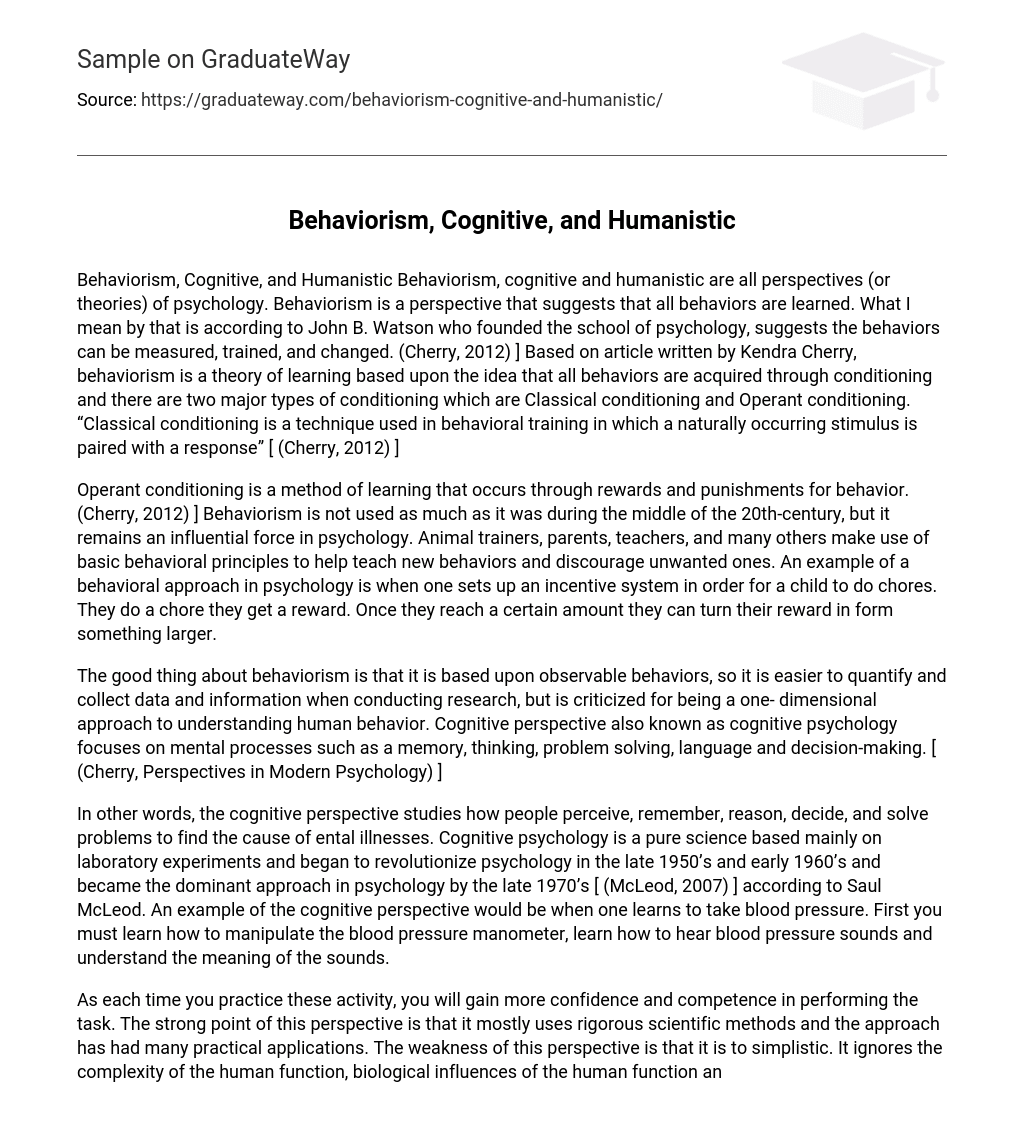Behaviorism, cognitive, and humanistic perspectives in psychology have distinct focuses on behavior. The founder of behaviorism, John B. Watson, posits that this perspective highlights the learning-based acquisition of behaviors and their potential for measurement, training, and modification (Cherry, 2012).
The theory of behaviorism, as discussed by Kendra Cherry, states that all behaviors are learned through conditioning. There are two main types of conditioning: Classical conditioning and Operant conditioning. Classical conditioning involves pairing a naturally occurring stimulus with a response, according to Cherry (2012).
Despite its decreased usage compared to the mid-20th century, operant conditioning remains influential in psychology (Cherry, 2012). Different individuals, including animal trainers, parents, and teachers, still rely on fundamental behavioral principles to facilitate teaching new behaviors and discouraging undesirable ones. For instance, a behavioral approach can be employed in psychology by introducing an incentive system to motivate children to perform chores. Upon completing a chore, they are rewarded and can accrue these rewards to exchange for a larger item or experience once a specific number of rewards is reached.
Behaviorism is advantageous due to its concentration on observable behaviors, which simplifies data gathering in research. Nevertheless, it has faced criticism for its restricted comprehension of human behavior. In contrast, the cognitive perspective, also known as cognitive psychology, emphasizes mental processes like memory, thinking, problem-solving, language, and decision-making (Cherry, Perspectives in Modern Psychology).
The cognitive perspective in psychology is centered around the study of how individuals perceive, remember, reason, decide, and solve problems to determine the causes of mental illnesses. It has had a significant impact on psychology since the late 1950s and early 1960s through laboratory experiments. By the late 1970s, it became the prevailing approach in the field (McLeod, 2007). An illustration of this perspective can be observed in learning how to measure blood pressure. This process entails acquiring abilities to operate a blood pressure manometer, interpret blood pressure sounds, and comprehend their importance.
Repeating these activities will improve your confidence and skill in the task. This approach is based on rigorous scientific methods and has been widely used. However, it oversimplifies by ignoring the complex aspects of human function, biological influences, emotions, conscious experience, and free will.
The humanistic perspective in psychology, popularized by Carlo Rogers and Abraham Maslow, focuses on the capacity of humans to make choices and develop. This perspective promotes a positive view of human nature and potential, emphasizing that each individual is accountable for their own happiness and well-being. According to McLeod (2007), the humanistic approach values every person, recognizes the significance of human values, and acknowledges the active and creative nature of humans. The objective of humanistic psychology remains pertinent today as it did during the 1940s and 1950s.
According to Maureen O’Hara, a former president of the Association of Humanistic Psychology, it is essential for us to grasp the concept of diverse communities consisting of empowered individuals who have the freedom to shape their own narratives and identities. She emphasizes that these communities can peacefully coexist and that living in such environments could potentially propel human consciousness forward beyond any past experiences (Cherry, Archive for the ‘Psychology of Education’ Category, 2012).
Even in modern times, humanistic psychology remains popular and has greatly influenced various branches of psychology. One noteworthy characteristic of the humanistic perspective is its emphasis on environmental factors, rather than solely focusing on our internal thoughts and desires.
The challenge lies in the fact that the significance of personal experience hinders the objective examination and quantification of humanistic aspects. However, we can depend on individuals’ self-evaluation of their experience (Cherry, Archive for the ‘Psychology of Education’ Category, 2012).
Behaviorism, cognitive psychology, and humanistic psychology have all made significant contributions to our comprehension of the human mind and behavior. They each concentrate on distinct facets of studying the mind, brain, and behavior. The absence of these varied viewpoints in psychology would severely limit our understanding of ourselves and others.
References
- Cherry, K. (2012, July 24). Archive for the ‘Psychology of Education’ Category. Retrieved from teo-education. com: http://www. teo-education. com/teo/? at=70
- Cherry, K. (2012). What is Behaviorism? Retrieved from psychology. about. com: http://psychology. about. com/od/behavioralpsychology/f/behaviorism. htm
- Cherry, K. (n. d. ). Perspectives in Modern Psychology. Retrieved from psychology. about. com: http://psychology. about. com/od/psychology101/a/perspectives. htm
- McLeod, S. (2007). Cognitive Psychology. Retrieved from simplypsychology. org: http://www. simplypsychology. org/cognitive. html
- McLeod, S. (2007). Humanism. Retrieved from simplypsychology. org: http://www. simplypsychology. org/humanistic. html





